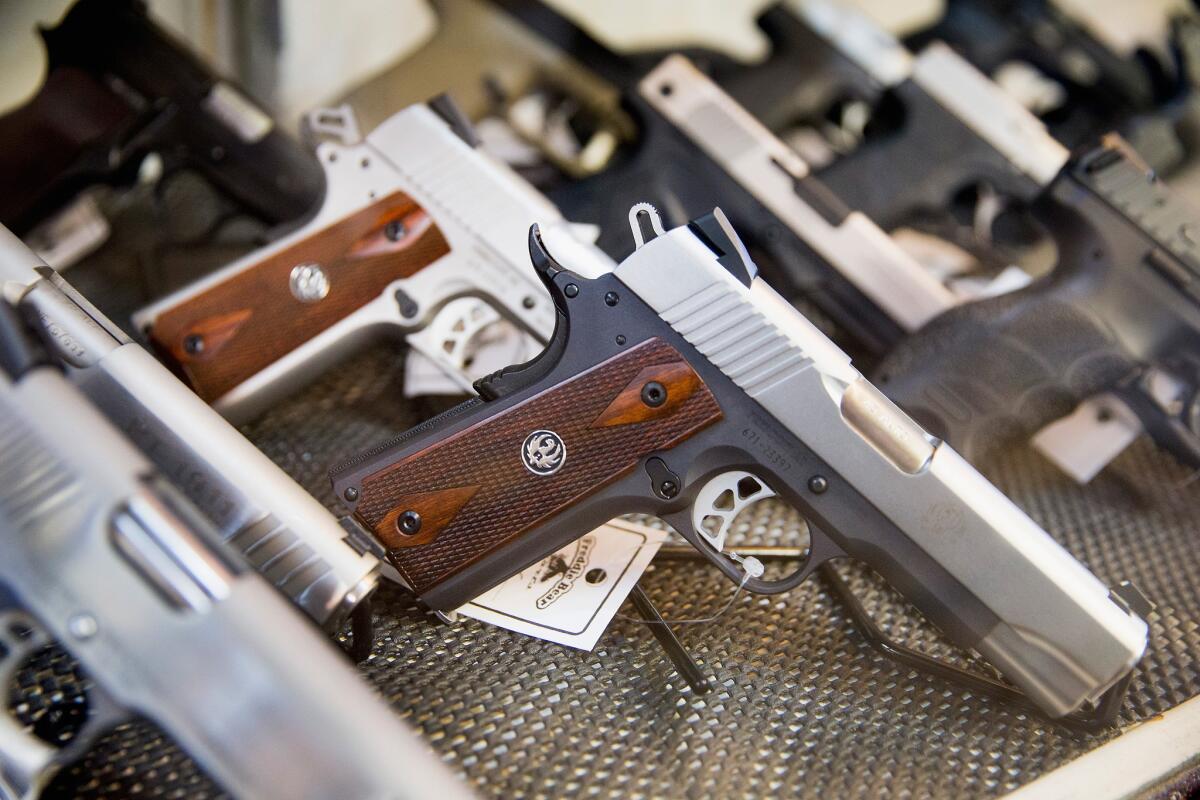Op-Ed: Does owning a gun make you safer?

Handguns are offered for sale at store in Illinois on March 11. According to a survey conducted by the University of Chicago, 32% of Americans own guns, down from a high of 50% in the 1970s and early 1980s.
The United States has the most heavily armed civilian population in the First World; our homes contain enough firearms for every man, woman and child.
Why do so many Americans own guns? The main reason, according to surveys, is protection. Advocates argue that guns in the home both deter crime (criminals refrain from even trying to break in because they fear being shot by an armed citizen) and thwart it (an armed citizen can stop a crime in progress, preventing injury or theft).
The scientific evidence, however, provides little support for these arguments. Quite the opposite.
In terms of deterrence, a recent study found that states with higher levels of household gun ownership have higher levels of firearm crime and do not have lower levels of other types of crime.
Another study, in 2003, found that counties with higher levels of household gun ownership have higher rates of household burglary, not lower. Burglars like to steal not only cash and jewelry but also guns. A homeowner with a collection of firearms may not want to advertise that fact.
As for thwarting crime, gun advocates claim that guns are commonly used in self-defense, and that without a firearm, one is essentially at the mercy of a criminal. Yet, again, that is not what the data show.
The National Crime Victimization Survey is the primary source of information on the nature and extent of criminal victimization in the United States. Some 90,000 households, comprising about 160,000 individuals, are surveyed twice a year.
Along with Sara Solnick, a professor of economics at the University of Vermont, I analyzed the data for the five-year period from 2007 to 2011, looking at more than 14,000 crimes in which there was some degree of personal contact between the victim and perpetrator — incidents in which a self-protective action by the victim was theoretically possible (for example, assaults and robberies).
More than 42% of the time, the victim took some action — maced the offender, yelled at the offender, struggled, ran away, or called the police. Victims used a gun in less than 1% of the incidents (127/14,145). In other words, actual self-defense gun use, even in our gun-rich country, is rare.
It is sometimes claimed that guns are particularly beneficial to potentially weaker victims, such as women. Yet of the more than 300 sexual assaults reported in the surveys, the number of times women were able to use a gun to protect themselves was zero.
Indeed, a study of 10 previous years of crime survey data found that of more than 1,100 sexual assaults, in only one did the victim use a gun in self-defense.
The data, moreover, do not provide support for the notion that using a gun in self-defense reduces the likelihood of injury. Slightly more than 4% of victims were injured during or after a self-defense gun use — the same percentage as were injured during or after taking other protective actions. Some other forms of protective actions were associated with higher rates of injury (for example, struggling) and some with lower (for example, running away).
Guns did seem beneficial in one category: protecting against loss of property. Looking only at crimes in which the intent was to steal , the victim lost property in only 38% of the incidents when using a gun, compared with 56% of the incidents when taking other actions. But using some other weapon — Mace, for instance — appeared equally effective as using a gun.
Almost two-thirds of the people in the U.S. population live in homes without guns, and there is no evidence that the inhabitants of these homes are at greater risk of being robbed, injured or killed by criminals compared with citizens in homes with guns. Instead, the evidence is overwhelming that a gun in the home increases the likelihood not only that a household member will be shot accidentally, but also that someone in the home will die in a suicide or homicide.
In addition, hundreds of thousands of household guns are stolen each year. Gun theft is a main pathway by which guns end up in criminal hands. The public health costs of gun ownership are very high.
That is why physician organizations — who care about your health and often see firsthand the harmful effects of firearms — suggest that you very carefully weigh the actual costs and benefits before bringing a lethal weapon into your home.
David Hemenway is a professor at the Harvard School of Public Health and director of the Harvard Injury Control Research Center.
Follow the Opinion section on Twitter @latimesopinion and Facebook
More to Read
A cure for the common opinion
Get thought-provoking perspectives with our weekly newsletter.
You may occasionally receive promotional content from the Los Angeles Times.










